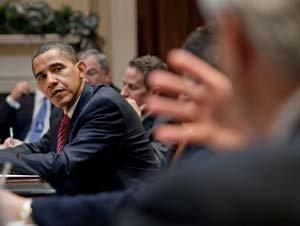Washington and the economy
President Obama meets with bank executives on December 14, 2009. (Image: White House Photo, Pete Souza)
Story by Manuel Quinones, CNC News
It was called the year of hope and change. America’s first African American president took office with his party in control of Congress.
In February, President Obama came to Capitol Hill to outline his plans for economic recovery. Freshman Rep. Jim Himes (D-CT), like so many Democrats, was thrilled with the possibilities.
“To be in this building surrounded by these statues and to be in a moment where in a moment of crisis the President calls us to think outside of ourselves, to be ready to sacrifice…” Himes said in awe of the moment.
In his speech, the President touted the passage of the $787 billion recovery package.
This year, lawmakers also extended Federal unemployment benefits, and approved legislation to deal with the foreclosure crisis and the troubled auto industry. Remember “Crash for Clunkers?”
“We were able to through the stimulus package, begin to create jobs in our country, we prevented massive layoffs,” said Sen. Barbara Mikulski (D-MD).
White House number crunchers say the stimulus has put more than 640,000 Americans to work. Plus, the economy is back on the upward trend.
Rep. Tim Bishop (D-NY) says the recovery package helped folks back home in Long Island avoid higher taxes.
“Had we not passed the stimulus, every single homeowner on Long Island would have seen a dramatically increased tax levy for schools and we were able to avoid that,” Bishop said.
Bishop’s Long Island colleague sees things differently.
“Money on top of money, the President said the jobs would come almost immediately, instead the situation gets worse by the week,” said Rep. Peter King (R-NY)
Republicans say Democratic plans for recovery, especially the stimulus, have been wasteful and largely ineffective.
“I find that most of what Congress has done has been rather overreaching, in terms of the amount of money that has been spent, the debt that has been accumulated,” said Rep. Glenn Thompson (R-PA).
This year, Congress voted to increase regulation of tobacco products. Lawmakers also reined in credit card fees and increases. Legislation sponsor Rep. Carolyn Maloney (D-NY) was thrilled when it got so much Republican support.
“The support of President Obama, the support of the American people,” Maloney said, “and really the need for ending unfair, deceptive, anti-competitive practices.”
Reforming health care was this year’s other major agenda item. The House and Senate each passed versions of the overhaul, which lawmakers have yet to reconcile.
Negotiations took months and several Congressional panels passed their own plans. At one point, Sen. Chris Dodd (D-CT) sat in for an ailing Ted Kennedy as Chairman of the Health, Education, Labor and Pensions (HELP) Committee.
“My intention is not to jam anything or force anything on people, but go through a process whereby we can talk to each other,” Dodd said during that panel’s health reform talks.
While one Connecticut Senator fought for a government health insurance plan as part of the overhaul, the other helped lead the opposition.
“I think the last thing we want to do now is to create another Washington run health insurance company,” said Sen. Joseph Lieberman (I-CT).
In the end, Lieberman got his way.
The nomination of Sonia Sotomayor to the Supreme Court was another major story in 2009.
During the July confirmation hearings, Sen. Chuck Schumer (D-NY) praised her qualifications. “A number of Republicans came over to me after the first day and then the second day and said, wow she is good!”
This year the House also passed legislation to deal with global warming. Republicans blasted the so-called ‘Cap and Trade’ bill, calling it ‘Cap and Tax.’
“Fortunately it has not gone anywhere in the Senate,” said Rep. Bill Schuster (R-PA). “So we saved American business and the American people from that travesty.”
The climate bill is in the Senate’s inbox for next year along with Financial Reform legislation.
“We need to make sure what we saw happen in the last year never happens again. That Wall Street doesn’t take the kind of risks they took,” said Himes, a former Goldman Sachs executive and member of the House Financial Services Committee.
Despite this year’s Congressional efforts, the economy is still sluggish. Unemployment stands at 10% and American families are still losing their homes to foreclosure.
That’s why Democrats have been pushing a new jobs bill. They’re hoping for a significant turnaround in advance of the midterm elections, fearing the stubborn economy may jeopardize their majority on Capitol Hill.
“We’re not satisfied with the current status of the economy,” said Sen. Ben Cardin (D-MD). “I think if we didn’t do what we did with the Recovery Act and other measures that we took, it would have been a lot worse.”
Created by Bureau Chief and Executive Producer Melinda Wittstock, Capitol News Connection from PRI provides insightful, localized coverage of participating stations’ congressional delegations.
Every day, reporters and producers at The World are hard at work bringing you human-centered news from across the globe. But we can’t do it without you. We need your support to ensure we can continue this work for another year.
Make a gift today, and you’ll help us unlock a matching gift of $67,000!
